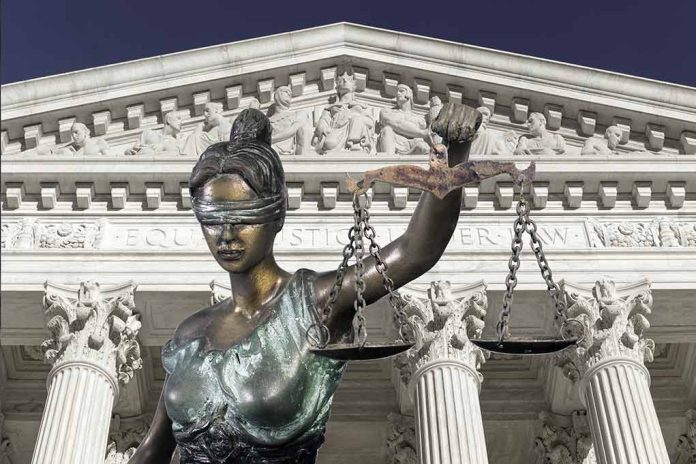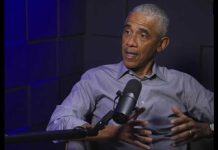
President Trump’s legal team has launched a bold federal appeal against his hush money conviction, potentially setting a precedent that could erase his state felony status based on presidential immunity grounds.
Key Takeaways
- President Trump is seeking to transfer his 34-count business fraud conviction from state to federal court based on the Supreme Court’s presidential immunity ruling.
- Trump’s legal team argues the case involves actions taken during his official presidential duties, making federal jurisdiction appropriate.
- The Department of Justice supports Trump’s appeal while Manhattan DA Alvin Bragg contends the case cannot be moved after sentencing.
- Despite receiving an unconditional discharge with no jail time or fines, Trump currently remains a convicted felon under state law.
- Oral arguments were heard on June 11, 2025, with a decision that could significantly impact legal precedents on presidential immunity.
Presidential Immunity at the Center of Legal Strategy
President Trump’s legal team has mounted a strategic federal appeal that could potentially nullify his state conviction related to hush money payments to Stormy Daniels. The appeal hinges on a Supreme Court decision regarding presidential immunity that was issued after Trump’s conviction. His attorneys argue this recent ruling provides “good cause” for moving the case from state to federal jurisdiction, as the charges are intrinsically connected to his official duties as President of the United States. This legal maneuver represents a significant test of how presidential immunity protections should be interpreted and applied.
Trump’s attorney Jeff Wall made a compelling argument during the hearing, emphasizing the unprecedented nature of the case against a sitting president. “The federal officer is entitled to a federal forum, not to have those arguments heard in state court. And if that’s true for a normal federal officer in a normal criminal prosecution, it certainly ought to be true for the president of the United States and for what we can all recognize is an anomalous, one-of-its kind prosecution,” stated Jeff Wall, Trump’s attorney.
JUST PUBLISHED: Trump Appeals Bogus 'Hush Money' Conviction. PULSE POINTS:
❓What Happened: President Donald J. Trump’s attorneys are appealing his conviction in a so-called hush money case in New York, seeking to move it to federal court following last year's U.S. Supreme Court…— The National Pulse (@TheNatPulse) June 11, 2025
Manhattan DA Opposes Jurisdictional Change
Manhattan District Attorney Alvin Bragg’s office has taken a firm stance against Trump’s appeal, arguing that the attempt to move the case comes too late in the legal process. Steven Wu, representing the DA’s office, claimed during arguments that allowing such a transfer would undermine state sovereignty in criminal matters. “It is not to divert a state criminal proceeding into a federal court for direct appellate review. That offends fundamental principles of respect for state sovereignty over the criminal process,” argued Steven Wu, representative for the Manhattan DA’s office.
The three-judge panel from the 2nd U.S. Circuit Court of Appeals, notably comprised of judges appointed by Obama and Biden, will determine whether Trump’s case can be moved to federal court after sentencing has already occurred. This timing issue forms a critical part of the prosecution’s argument against the transfer, though Trump’s team contends that the Supreme Court’s intervening decision on presidential immunity creates exceptional circumstances that justify the unusual procedural request. The Department of Justice has notably sided with President Trump in this matter, lending significant weight to his position.
Implications Beyond the Current Case
President Trump received an unconditional discharge following his conviction on 34 counts of business fraud, meaning he faces no jail time, probation, or fines. However, he still bears the status of a convicted felon under state law. The appeal represents more than just an attempt to clear his record—it could establish critical precedent regarding the scope of presidential immunity and the boundaries between state and federal jurisdiction in cases involving presidential actions. Trump’s legal team is simultaneously pursuing a separate appeal of the conviction itself, with arguments due by late July.
“There was evidence that came in a trial that triggered an immunity that the Supreme Court recognized after trial. If an intervening decision of the Supreme Court says that a case is of the kind that should come into federal court, of course you trigger the removal statute,” explained Jeff Wall, Trump’s attorney.
Legal experts note that even if the case is successfully moved to federal court, it may not affect Trump’s ability to pardon himself, as it would still technically remain a state conviction. However, a federal court could potentially dismiss the case entirely based on presidential immunity grounds, effectively erasing the conviction. The outcome of this appeal could have far-reaching consequences for how future legal challenges against presidents and former presidents are handled, potentially strengthening protections for official presidential actions against state prosecutions.



